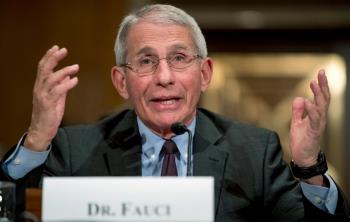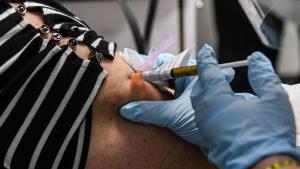 It is axiomatic that restoration of our economy will be dependent on an effective vaccine accepted by at least 60 percent of our population. During the past two weeks, Pfizer and Moderna have publicized preliminary data in press releases indicating over 90 percent effectiveness of their respective mRNA vaccines. Both Pfizer and Moderna conducted their trials in the U.S. in addition to other nations and have submitted data to the FDA to be considered for emergency use authorization. (EUA).
It is axiomatic that restoration of our economy will be dependent on an effective vaccine accepted by at least 60 percent of our population. During the past two weeks, Pfizer and Moderna have publicized preliminary data in press releases indicating over 90 percent effectiveness of their respective mRNA vaccines. Both Pfizer and Moderna conducted their trials in the U.S. in addition to other nations and have submitted data to the FDA to be considered for emergency use authorization. (EUA).
It is noted that the Pfizer-BioNTech vaccine requires a critical cold chain that will represent logistic problems in distribution. The Moderna vaccine has a less rigorous temperature requirement that will facilitate widespread administration especially in rural areas.
On Monday, November 23rd, AstraZeneca noted that their adenovirus-vectored COVID vaccine was up to 90 percent effective when administered to recipients according to a specific dose sequence, as part of their Phase-3 trial. Using two similar full doses they achieved 60 percent protection.  The AstraZeneca vaccine developed in collaboration with Oxford University is a more conventional vaccine than the Moderna and Pfizer mRNA products and is based on a simian (Ad5) adenovirus vector with inserted genes coding for SARS-CoV-2 spike protein. Two doses of this vaccine are required but the product can be stored under conventional refrigeration. AstraZeneca will complete their dossier before the end of the year. The Russian ‘Sputnik-5’ vaccine is similar in principle to the AstraZenica vaccine but uses two different adenovirus vectors for the first (Ad26) and second (Ad5) doses. The Novovax subunit vaccine has yet to be tested.
The AstraZeneca vaccine developed in collaboration with Oxford University is a more conventional vaccine than the Moderna and Pfizer mRNA products and is based on a simian (Ad5) adenovirus vector with inserted genes coding for SARS-CoV-2 spike protein. Two doses of this vaccine are required but the product can be stored under conventional refrigeration. AstraZeneca will complete their dossier before the end of the year. The Russian ‘Sputnik-5’ vaccine is similar in principle to the AstraZenica vaccine but uses two different adenovirus vectors for the first (Ad26) and second (Ad5) doses. The Novovax subunit vaccine has yet to be tested.
On Sunday November 22nd Dr. Anthony Fauci, Director of the National Institute of Allergy and Infectious Diseases (NIAID) explained the review sequence to approve a COVID vaccine.
- The company manufacturing the vaccine must compile data, subjected to rigorous statistical analysis in a dossier including details of the development and manufacture of the vaccine, the protocol for trials and the results with an interpretation
- The portfolio is reviewed by NIAID
- The company submits the application to the U.S. Food and Drug Administration to be critically and comprehensively reviewed by career scientists with specific expertise in the fields of virology, statistics, pathology and infectious diseases.
- The Vaccines and Related Biological Products Advisory Committee external to the FDA also reviews the data and makes a recommendation. This body is scheduled to convene on December 10th having previously studied the submission by each applicant for approval.
- The Commissioner of the FDA reviews the recommendations of the internal career scientists and the Advisory Committee before granting emergency use authorization
- Permanent approval is subject to a formal and more rigorous review including safety data and duration of immune response based on longer-term application over a larger number of recipients
The application by AstraZeneca may be delayed in the U.S. given questions over efficacy in relation to dose and review of their Phase-3 trial that was conducted simultaneously in the U.S., South Africa, Brazil, the UK and other EU nations. It is anticipated that emergency use authorization will be granted by regulators in the UK and EU based on an evaluation of results and that this vaccine will be distributed in both industrialized and developing nations.
In commenting on the reported 95 percent efficacy of the Pfizer and Moderna vaccines, Dr. Anthony Fauci stated, "it can't get much better than that. I think what people need to appreciate - and that’s what I have said like maybe a hundred times in the last week or two - is the process by which a decision is made". Facui noted that Dr. Stephen Hahn, the Commissioner of the FDA has publicly vowed that he will accede to the opinions of the career scientist and the Advisory Board and his decision will be independent of any political pressure. The companies producing vaccines under the DHHS ‘Warp Speed’ program issued a statement in October amid pre-election rhetoric and implied pressure that they would only submit data to FDA when they were convinced that their respective vaccines were both safe and effective as demonstrated in approved Phase-3 trials.
The question of acceptability is now the major challenge facing immunization of the U.S. population. Our citizens must be confident that vaccines have been thoroughly tested in order to achieve a compliance rate in excess of 60 percent of those eligible using a two-dose program. Currently there is considerable concern over efficacy and safety as evidenced by surveys that show a low intent to receive the vaccine when it becomes available. Administering the small quantity of available vaccine in late December to medical care-givers, first responders and those at high risk of complications will improve confidence. The fact that there is now interaction and cooperation between the current and the incoming administration will ensure a smooth transition with seamless execution. Hopefully initial experience denoting acceptable immunity and freedom from adverse reactions will lead to high rates of uptake when vaccines become available to the general public in adequate quantities during the second quarter of 2021 onwards.